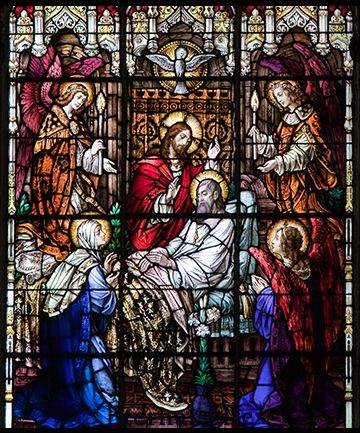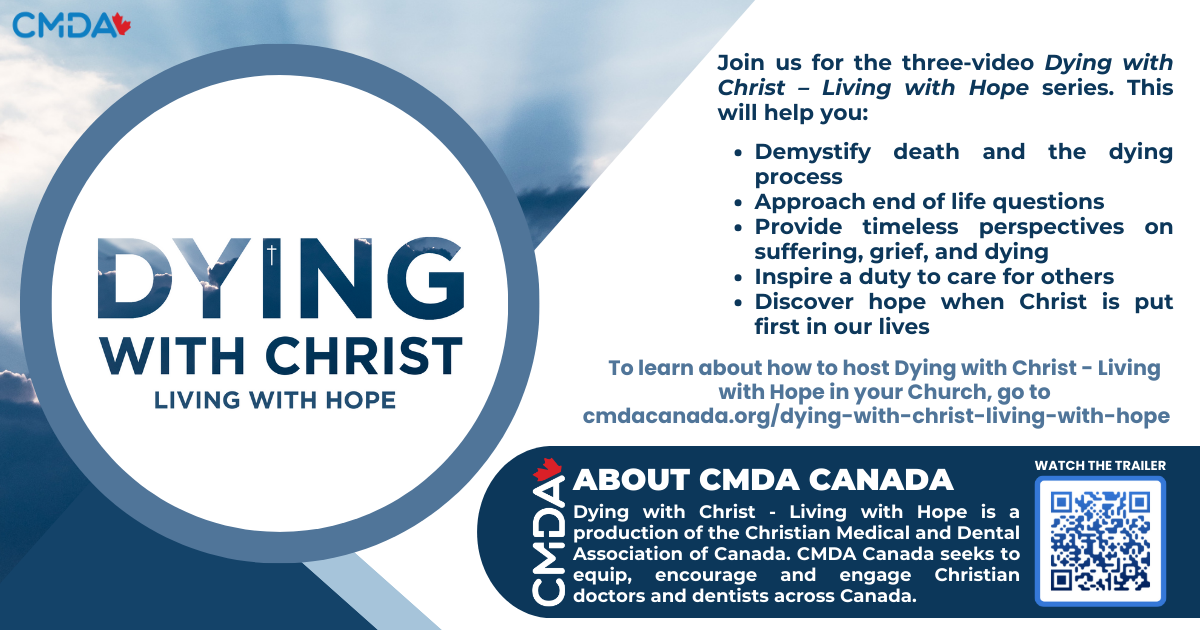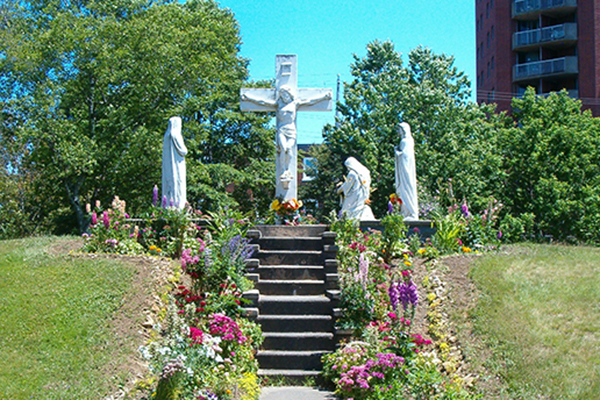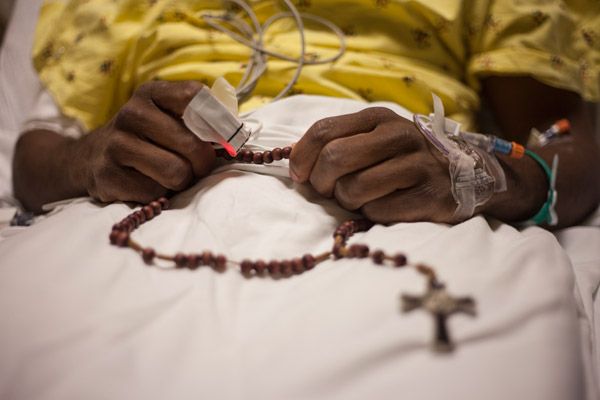
as we care for the sick and comfort the dying.

Death of St. Joseph
Stain Glass Window, St. Mary’s Cathedral Basilica, Halifax, NS
Dying with Christ, Living with Hope

MAiD - Reflection Series
Preview
What is the meaning of life? The legalization of euthanasia (Medical Assistance in Dying) in Canada in 2016 has raised some serious questions on the meaning and value of human life. Traditional Christian values have insisted that euthanasia is not compatible with the Christian faith. Today marks the first installment of a series of reflections that describe the Christian idea of death and gives clear reasons why euthanasia is not consistent with Christian values and a Christian life.
The Meaning of Life
What is the meaning of life? For the Christian our meaning comes from knowing, loving and serving Christ both in this world and into the next. Having faith in Christ brings about personal change as our values, ideas and desires are gradually transformed to become the values, ideas and desires of Christ. Our respect for human dignity grows as does our desire to help people who are experiencing vulnerability. We need to remember that when we look into the face of a person who is very sick, or who is living with a disability or chronic health condition we are looking at the face of Christ: “Whatever you did for one of the least of these brothers and sisters of mine, you did for me.” Mt. 25:40 (NIV) Despite what we may think, the death of a patient through euthanasia does not help anyone know, love or serve Christ better. Christ’s response to people who are experiencing vulnerability is to come alongside them, alleviate their suffering and support them in their time of need. (cf. Luke 10:25-37) Jesus never killed anyone, and neither should we.
At Home Reflection: Faith in Christ helps us to see the creative hand of God in each person we meet, as the psalmist says, “I praise you because I am fearfully and wonderfully made; your works are wonderful, I know that full well.” Ps. 139:14 (NIV) Spend time at home reflecting on God’s purpose for humanity and for your own life.
The Christian Medical and Dental Association of Canada offers a three-part course on this topic called Dying with Christ – Living with Hope. For more information visit https://cmdacanada.org/dying-with-christ-living-with-hope/
Preview
Whose life are you living? The apostle Paul said “it is no longer I who live, but it is Christ who lives in me.“ (Gal 2:20 NRSV-CE) By a series of decisions and actions made in faith the Christian expresses their desire to be like Christ in their life in the world. But what about euthanasia? Is this something that a Christian can participate in and still imitate Christ? Traditional Christian values have insisted that euthanasia is not compatible with the Christian faith. Today marks the second installment of a series that describes the Christian idea of death and gives clear reasons why euthanasia is not a choice consistent with living your life in Christ.
Whose life are you living?
The apostle Paul said the following in his letter to the Galatians “it is no longer I who live, but it is Christ who lives in me.“ (Gal 2:20 NRSV-CE) By a series of decisions and actions made in faith, the Christian expresses their desire to be like Christ in their life in the world. This requires a willingness to turn away from the temptation of selfish motives and do the right thing, gradually making Christ more and more present in the world. Sometimes it can be difficult to make these choices. Christians have the Holy Spirit which leads us in all truth so that we know what is good and have the courage to do it. The Holy Spirit speaks through the scriptures and the teaching of the Christian community to help us to choose what is the will of Christ: “what is good and acceptable and perfect”. (Rom. 12:2 NRSV – CE) Traditional Christian teaching on euthanasia follows the Ten Commandments which teach: “You shall not murder” (Ex. 20:13) As we “do the right thing” we find that we are rewarded with an even greater trust in God who cares for us in the midst of our vulnerability. (cf. Mt. 6:33) The more vulnerable we become the more we learn to rely on Christ. This process gradually prepares us for eternity in heaven when He will truly be our “all in all”. (cf. Col. 3:11)
At Home Reflection: Take a moment and ask yourself this question: “Have I turned over my life completely to Christ?” For most people, if we are being honest, this process is gradual. Take a moment and do a personal inventory. What areas of your life have you not given over to Christ? What areas do you make decisions before consulting him because you are not sure what he will say? Ask Jesus in prayer to come into your heart and direct you to be the person he wants you to be in all areas of your life. Spend time at home reflecting on God’s purpose for humanity and for your own life.
The Christian Medical and Dental Association of Canada offers a three-part course on this topic called Dying with Christ – Living with Hope. For more information visit https://cmdacanada.org/dying-with-christ-living-with-hope/
Preview
What are you afraid of? Canada has one of the most technologically advanced healthcare systems in the world yet many Canadians are afraid that they will not be able to cope with end-of-life health care challenges. Palliative care physicians tell us that they are able to effectively treat all pain at end of life. Many people are choosing euthanasia because of the fear of pain, rather than the pain itself. What does Jesus tell us about fear and how to cope with it? This is the third in a series of reflections on a good Christian death and how euthanasia fuels fear, rather than trust in God’s love.
What are you afraid of?
What are you afraid of? God tells us more than 100 times in the Bible to not be afraid. In his first letter, John reminds us that “perfect love casts out fear”. (1 John 4:18 NRSV-CE) Jesus reminds us that we are of more value to God than anything else.
Are not five sparrows sold for two pennies? Yet not one of them is forgotten in God’s sight. But even the hairs of your head are all counted. Do not be afraid; you are of more value than many sparrows. (Luke 12:6-7)
Of course, it is natural to feel afraid at certain points in our lives. For those who have anxiety, fear may be a more common occurrence. The most important question is what do we do with the level of fear that we experience? Do we allow it to paralyse us and keep us from doing the right thing? Knowing God in an intimate way establishes trust in his loving kindness and helps us overcome fear, by reminding us of his presence. We can have courage even in the face of great challenges through the grace of God given to us through the sacraments, the scriptures and the love and support of others. In his last words in the gospel of Matthew to the early church in crisis Jesus says “And remember, I am with you always, to the end of the age.” (Mt. 28:20 NRSV – CE)
Christians don’t even need to fear death. As the apostle Paul says:
“Where, O death, is your victory? Where, O death, is your sting? The sting of death is sin, and the power of sin is the law. But thanks be to God, who gives us the victory through our Lord Jesus Christ. (1 Cor. 15:55-57 NRSV-CE)
Catholics love to pray the “Hail Mary” prayer, asking the Mother of Jesus to pray for us “now and at the hour of our death”. We seem to intuitively know that the hour of our death may be an uncertain and very dynamic time. What a comfort to know that Christ himself will be with us, along with the Blessed Mother, the communion of saints in heaven and the Christian community on earth to see us through our final journey to the celestial courts. And imagine what sights we will behold:
He will dwell with them, and they shall be his people, and God himself will be with them; he will wipe away every tear from their eyes, and death shall be no more, neither shall there be mourning nor crying nor pain any more, for the former things have passed away. Revelation 21:3-4 NRSVCE
For those who struggle with fear, there is the constant unconditional love of Christ that gives us strength to face the greatest hardships, even death.
At Home Reflection: Are you afraid of death? Spend some time praying about it. What is the aspect of death you fear the most? Could you discuss this particular fear with a trusted friend, health care professional, or family member? This is one way to uncover a fear and to respond constructively to it by getting the facts. Or take the fear to Jesus and ask him to help you cope with it. Spend some time slowly reading the three scripture passages in today’s reflection as you meditate on the love of Christ for each of us. Try to rest in His Presence and hopefully your fear will lessen in intensity. “God is our refuge and strength a very present help in trouble.” (Ps. 46:1 NRSV-CE)
The Christian Medical and Dental Association of Canada offers a three-part course on this topic called Dying with Christ – Living with Hope. For more information visit https://cmdacanada.org/dying-with-christ-living-with-hope/
Preview
What is a good Christian death? In the 14th century the church responded to the challenge of the Black Death with a manual that listed the components of a good death from a Christian perspective. They all focus on the preparation of the soul for passing into new life in Christ in heaven for all eternity. The emphasis is spiritual. Unfortunately, the modern world in which we live is very materialistic. The existence of the soul is denied and as a result decisions can be made that do not nourish the soul and may even damage it. Sadly, many of the promoters of euthanasia do not believe in God and do not see the spiritual damage brought by their policies.
What is a good Christian death?
During the Middle Ages, Europe was ravaged by the Black Death. A very popular manual arose which summarized for the average Christian the key steps to a good death. It was a comfort to people to set their eyes upon heaven to find solace and peace during a time of great social upheaval.
The key components of this manual called De Ars Moriendi (The Art of Dying) follow:
- We are called to prepare for death by living a good life, being prepared at any moment to be called home to the Lord
- We are faced with five primary temptations during the dying process (loss of faith, despair, impatience, pride, and avarice). We are called to overcome them by practicing the virtues (faithfulness, patience, humility and charity)
- We are urged to reaffirm our faith, repent of our sins, and draw closer to Christ. (This ordinarily occurs within the sacraments of the Anointing of the Sick, Reconciliation and Eucharist.)
- We are called to imitate Christ as HE faced death.
- We are invited to provide a testimony to those caring for us regarding our faith in Christ.
- When we are on the threshold of death, the final duty of those caring for us is to pray for our soul.
These simple, yet profound, prescriptions focus on the spiritual well-being of the patient and their preparation for eternal life. As Jesus promises in the gospel of John: “I am the resurrection and the life. Those who believe in me, even though they die, will live, and everyone who believes in me will never die.” (John 11:25-27 NRSV-CE)
At Home Reflection: What is good Christian death? Many people write a will, choose a Power of Attorney or a substitute decision maker. But have you made spiritual plans for your death? Sometimes people’s families have limited exposure to the Church and may not know how to make the appropriate arrangements. Take some time to write down your wishes and share those with your loved ones. It is important that we leave a good witness of our faith in Christ after our death. One never knows who might be impacted by a life lived in faith.
The Christian Medical and Dental Association of Canada offers a three-part course on this topic called Dying with Christ – Living with Hope. For more information visit https://cmdacanada.org/dying-with-christ-living-with-hope/

“… I have set before you life and death, blessings and curses. Choose life so that you and your descendants may live, loving the Lord your God, obeying him and holding fast to him; for that means life to you and length of days…” (Deut. 30:19)
Tenth Sunday of Ordinary Time
June 5, 2016
To the faithful of the Archdiocese of Halifax-Yarmouth,
Dear Friends,
Greetings and blessings to all of you!
Today, we stand on the threshold of a major cultural shift in our country. We do not know if tomorrow the Government of Canada will have enacted legislation confirming the practice of medically assisted suicide. Whatever the decision on this matter will be, the fact that such a practice can be imagined and legalized is a reflection of how much Canadian society has moved away from values which were commonly upheld, respected and rooted in the Christian foundations of Canada. These values are no longer supported culturally or legally. Respect for life from conception to natural death is no longer to be presumed or expected, nor is it protected by law.
It is important, therefore, that those of us who believe that life is sacred and a gift from God be encouraged to remain strong in our convictions; that we uphold our Christian faith and confirm our resolve to uphold life. In our daily confrontation with the challenges of our culture, it is always tempting to find ourselves drawn in by the allure of popular thinking and fall easily into the trap of following the crowd. Medically assisted death in our country has become widely supported and seen as an acceptable and efficient medical intervention for dealing with both suffering and death which can be called “medicalization of suffering and death”. However, suffering and death are not medical problems. They are part of life and human reality.
Medically assisted death is unacceptable. It is wrong and immoral by many standards including our Catholic teaching. In this matter we are now a minority among Canada’s citizens. In the life of our Church, this is not a new experience. Christians in the past have been in situations where they have had to stand up courageously and at great cost for what was held to be true. We are once again in such a context with regards to the defense of life, the mystery of suffering, the protection of the vulnerable and with regards to the freedom of conscience.
When we gather for the sacrifice of the Mass, we remind ourselves regularly that the mystery of our faith has to do with facing and overcoming death. This comes from Christ’s resurrection and the conviction that life does not end with death, it is changed and transformed. Faith in the Resurrection is what allows us to face with hope, even the inevitable sufferings associated with the end of our earthly life. This is the hope when upheld by a community of faith and the accompaniment of our brothers and sisters, which makes possible facing even the last temptation (the possibility of suicide) without falling into despair or feeling abandoned. This community’s assistance is crucially important because it counters the main reasons for requesting medically assisted death. Some of these reasons include intractable pain, but even more so and primarily, it is out of fear for the loss of dignity, guilt at being a burden, uncertainty regarding care needs and feeling of loss of control that medically assisted suicide is requested. These are real issues of human suffering for which medicine has no prescription. However, where a community committed to the care of suffering persons exists, it can diminish the fears and anxieties associated with end of life, and such a community can also protect a person’s right to live with dignity and die a good death.
Euthanasia and assisted suicide have been unacceptable by long-standing human understanding of life and death; wrong by traditional standards of morality, medical ethics and diverse religious perspectives. Now that medical assistance in dying will become an acceptable practice in our secular and pragmatic society, as Catholics we must learn to live our faith in this present unwelcoming culture which promotes death rather than respect for life. For us to choose life, as the word of God calls us to do, it will be necessary for our Church to develop a merciful and caring pastoral practice for all our fellow human beings but with particular attention to our sick and elderly, our vulnerable and poor. In this Year of Mercy, Pope Francis has challenged us to become evangelizing communities by showing mercy; by becoming more deeply involved in the lives of people; by facing life’s human struggles in the way we care and support each other, and by embracing each other’s sufferings.
For all these reasons, I exhort you to be well informed about what is at stake in the legalization of medically assisted suicide; to be very careful and attentive in your choice of health care providers; to insist on respect for your Christian values and to dialogue seriously with members of your community and family about your wishes, in end of life circumstances.
As Catholics we are Christian disciples committed to follow the way of the Lord whose response to suffering was to provide care! As Christ healed the sick and broken-hearted with his acts of compassion, our present Christian response to suffering must be in keeping with Christ’s actions by transforming suffering with meaning. When there is no meaning to suffering, that is when it is only pain, and of course people become afraid, angry and depressed. But where there is meaning, because there is love and proper care, in a community of support, suffering can become sacrifice! Sacrifice, in our Christian perspective, is not just another word for ‘put up with’. It literally means, from its Latin root, to make something ‘sacred’.
This is why I call upon every priest, deacon, religious and lay pastoral minister to work with the faithful at establishing a parish based pastoral ministry of care and compassion for all those in need in our communities . In this way, suffering can become transformed into something significant and sacred by sharing our faith and trust in God’s love by the concrete hands-on manner that we look after our brothers and sisters. In this spirit, let us demand adequate palliative care services from our healthcare institutions. Where this is not possible, can we find in our communities, ministers of compassion to assist and accompany the dying in our tradition of a good death? As we work on this, let us entrust our effort to Mary, who stood by her dying son, who is the Mother of the Church and ask her to continue to pray for us, “…now and at the hour of our death.” Amen.
†Anthony Mancini
Archbishop of Halifax-Yarmouth
Download FAQ on Physican Assisted Dying (Eng)
« ... je te propose la vie ou la mort,
la bénédiction ou la malédiction. Choisis donc la vie
pour que toi et ta postérité vous viviez,
aimant le Seigneur ton Dieu, écoutant sa voix,
vous attachant à lui; car là est ta vie
ainsi que la longue durée de ton séjour sur la terre
que le Seigneur a juré à tes pères de leur donner. »
(Deutéronome 30, 19)
Dixième dimanche du temps ordinaire
le 5 juin 2016
Aux fidèles de l’archidiocèse d’Halifax-Yarmouth,
Chers amis,
Salut et bénédictions à vous tous !
Aujourd’hui, nous nous trouvons sur le seuil d’un déplacement culturel majeur dans notre pays. Nous ne savons pas si demain le Gouvernement du Canada aura légiféré et confirmé la pratique du suicide médicalement assisté. Quelle que soit la décision, le fait qu’une telle loi puisse être imaginée et réglementée est un reflet qui montre comment la société canadienne s’est éloignée des valeurs qui étaient autrefois communément soutenues, respectées et enracinées dans les fondations chrétiennes du Canada. Ces valeurs ne sont plus soutenues ou promues culturellement et légalement. Le respect pour la vie de la conception à la mort naturelle ne peut plus être présumé ou anticipé; il n’est plus protégé par la loi.
Il devient désormais important que ceux qui croient que la vie est sacrée et qu’elle est un don de Dieu soient encouragés à demeurer forts et fidèles à leur conviction. Pour nous, dont le respect pour la vie est ancré dans nos racines religieuses et soutenu par notre foi chrétienne, il est important de confirmer fortement notre résolution de soutenir la vie. Dans nos entretiens quotidiens avec les autres personnes et avec les défis de notre culture, il est toujours tentant de nous laisser entrainer par la mode et le style de la pensée populaire, et de nous laisser facilement prendre au piège de suivre la foule, de faire comme les autres. La mort médicalement assistée dans notre pays est devenue une idée et une perception très répandues vues comme une intervention médicale qu’on peut appeler ‘la médicalisation de la souffrance et de la mort’. C’est comme si la souffrance et la mort étaient tout simplement des maladies et ce n’est pas le cas. La souffrance et la mort font partie de la vie et de la réalité.
La mort médicalement assistée est inacceptable. C’est un mal et un acte immoral à plusieurs points de vue, et aussi dans notre enseignement catholique. Sur ce point, nous reconnaissons que nous sommes une minorité parmi les citoyens canadiens. Cette situation dans la vie de notre Église n’est cependant pas une nouvelle expérience. Les chrétiens, à de multiples occasions au cours de leur histoire, se sont trouvés face à des situations où ils ont eu à se tenir debout courageusement pour ce qu’ils pensaient être la vérité, même si cela entrainait des sacrifices et coûtait très cher. Nous sommes encore une fois dans un tel contexte en regard de la défense de la vie, du mystère de la souffrance et de la protection des plus vulnérables, et en regard même de la liberté de conscience.
Régulièrement, quand nous nous rencontrons pour le sacrifice de la messe, nous rappelons que le mystère de notre foi concerne la confrontation et le dépassement de la mort. Cet enseignement vient de la conviction que la vie ne se termine pas avec la mort; la vie est transformée et elle continue par la suite. C’est cette foi dans la résurrection du Christ qui nous permet d’envisager l’avenir avec espérance, même devant les inévitables souffrances associées avec la fin de notre vie terrestre. Avec une telle espérance, avec l’aide de la communauté de foi et avec l‘accompagnement de nos frères et sœurs, il est possible d’affronter même la dernière tentation (celle du suicide) sans tomber dans le désespoir ou de se croire abandonnés par les autres. L’aide de la communauté de foi est importante de façon déterminante et vitale. Elle contrecarre les raisons principales qui pousseraient des personnes à demander une mort médicalement assistée. Les raisons évoquées ne sont pas principalement parce que la douleur serait intraitable ou intolérable, mais parce qu’elles proviennent de la peur d’une perte de dignité, ou de la culpabilité de devenir un poids pour les autres, ou de l’incertitude en ce qui a trait aux besoins de soin, ou encore au sentiment de perdre le contrôle de sa vie. Ce sont tous des problèmes de souffrance humaine pour lesquels la médecine n’a pas d’ordonnance, mais où la communauté, éprise d’un engagement ferme de soigner les souffrants, peut faire beaucoup pour alléger la peur et les anxiétés associées à la fin de vie. Avec l’aide d’une telle communauté, on peut aussi protéger le droit de la personne à la vie et à une bonne mort.
L’euthanasie, ou encore le suicide assisté, a été jugée inacceptable par une longue compréhension humaine de la vie et la mort. L’euthanasie est également mauvaise selon les standards traditionnels de la moralité; par les codes de l'éthique médicale; et diverses perspectives religieuses. Cependant, du moment que le suicide assisté va devenir de plus en plus pratique commune dans notre société séculière et pragmatique, nous, comme catholiques, devons apprendre à vivre notre foi au milieu de cette culture qui promeut la mort plutôt que le respect de la vie. Pour choisir la vie, comme la Parole de Dieu nous invite à le faire, il sera nécessaire et essentiel pour notre Église de développer une pratique pastorale de la miséricorde et de la compassion avec laquelle nous devrons accompagner tous nos frères et sœurs. Ayons une attention toute particulière envers les malades et les personnes âgées, les plus vulnérables et les pauvres. En cette année de la miséricorde, le pape François nous a mis au défi de devenir des communautés évangélisatrices en démontrant plus de compassion, en nous engageant plus à fond dans la vie des gens, en affrontant les luttes pénibles de la vie humaine, en diversifiant notre action par notre manière chrétienne d’aider, en nous soutenant les uns les autres et en laissant comprendre à nos frères et sœurs que nous comprenons leurs souffrances de l’intérieur.
C’est pour toutes ces raisons que je vous exhorte de bien vous renseigner au sujet de ce qui est en jeu dans la légalisation du suicide médicalement assisté. Soyez très attentifs et prudents dans votre choix de ceux qui vont vous fournir des soins. Insistez pour qu’on respecte vos valeurs chrétiennes. Dialoguez sérieusement avec les membres de votre famille et de votre communauté au sujet de vos souhaits, intentions et volontés dans les circonstances de la fin de votre vie.
Comme catholiques, nous sommes disciples du Christ suivant la voie du Seigneur qui a toujours répondu aux souffrants avec soin et compassion. Le Christ a guéri des malades et des cœurs brisés en étant compréhensif et miséricordieux. La réponse du chrétien face à la souffrance, en solidarité avec les actions du Christ, sera de donner au mot ‘souffrance’ un sens positif, un sens de vie. Quand il n’y a pas de sens à la souffrance, il n’y a que la douleur, et il est bien évident alors que le monde puisse avoir peur, être fâché ou déprimé. Mais là où il y a du sens, là où il y a de l’amour et des soins appropriés, là où il y a une communauté de soutien, alors la souffrance peut devenir un vrai sacrifice. « Sacrifice » ne veut pas seulement dire « endurer » mais, dans la perspective chrétienne, ce mot veut dire littéralement, à partir de sa racine latine, rendre quelque chose sacré.
C’est pourquoi j’interpelle chaque prêtre, diacre, ministre religieux ou laïque, à travailler avec l’ensemble des fidèles pour établir un ministère pastoral de soin et de compassion dans chacune de nos communautés de foi. De cette manière, la souffrance pourra devenir quelque chose de significatif et de sacré, pourvu que nous partagions notre foi et notre confiance en l’amour de Dieu que nous exprimons dans la manière dont nous prenons soin de nos frères et sœurs.
Dans cet esprit, exigeons des soins palliatifs adéquats de nos institutions de santé. Et où cela n’est pas possible, que nous cherchions, à l’intérieur de nos communautés, des ministres de compassion pour assister et accompagner les mourants, selon notre tradition de la bonne mort.
Confions nos efforts communautaires à Marie, qui s’est tenue debout devant son fils mourant. Elle est la mère de l’Église. Demandons-lui de continuer à prier pour nous... « maintenant et jusqu’à l’heure de notre mort. » Amen
†Anthony Mancini
Archevêque d’Halifax-Yarmouth
Download FAQ on Physican Assisted Dying (Fr)
Pastoral Letters on Physician Assisted Dying

* Pastoral Letter on Physician Assisted Dying (Eng/Fr)
By Archbishop Mancini - Link
(includes a download - FAQ on Physican Assisted Dying)
* A Pastoral Reflection on Medical Assistance in Dying
by the Atlantic Bishops
English
French



